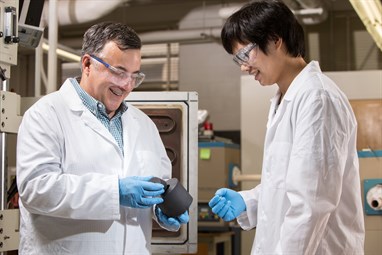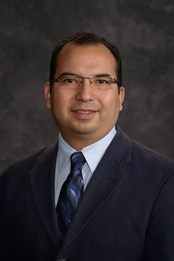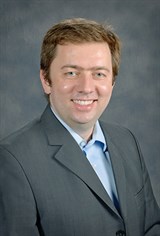As of September 2017, the Department of Materials Science and Engineering at Texas A&M University will be home to three ongoing National Science Foundation (NSF) projects through the Designing Materials to Revolutionize and Engineer our Future (DMREF) projects. The goal of the program is to accelerate the development of groundbreaking new materials while reducing development costs.
“To have three ongoing DMREF projects in a department as new and small as ours is a testament to the terrific growth we have experienced over the past few years,” said Dr. Ibrahim Karaman, materials science and engineering department head.
The department’s newest DMREF project will launch under the leadership of Dr. Miladin Radovic. It joins two pre-existing projects led by Dr. Raymundo Arróyave and Dr. Michael Demkowicz.

Radovic’s project focuses on designing alumina-forming MAX phases: a class of materials with outstanding mechanical properties at extremely high temperatures. Their potential future applications include power generation, energy conversion, transportation and defense.
“The ultimate goal of this project is to achieve unprecedented MAX phase performance at temperatures up to 1500 degrees Celsius,” said Radovic, associate professor in the department. “We will investigate a wide range of MAX phase alloys and microstructures using high-throughput computations, synthesis and characterization.”
Radovic is collaborating with co-principal investigators Arroyave and Dr. Ankit Srivastava from Texas A&M, and Dr. Michel Barsoum from Drexel University.

Arróyave’s project uses advanced computing to create novel high-temperature shape memory alloys. These materials can be used to build miniaturized motors and shape-changing structures, solid-state actuators for aeroelastic tailoring, noise and flow control, and light-weighting in airplanes, automobiles, and for energy extraction in the oil and gas industries.
“Our work focuses on identifying the alloy chemistry and thermal processing necessary to import these enabling materials with desired performance metrics to be used in next-generation subsonic, supersonic and hypersonic flights,” said Arróyave, professor and presidential impact fellow in the department. “This is truly a hard problem in materials research that we are trying to solve through a highly interdisciplinary approach. If successful, our project will demonstrate a powerful accelerated materials development framework that could be applied to a wide range of materials.”
Arróyave is collaborating with co-principal investigators Dr. Dimitris Lagoudas, Karaman, Dr. Amine Benzerga and Dr. Ed Dougherty from Texas A&M, and Dr. Theocharis Baxevanis from the University of Houston.
Demkowicz’s project develops ultra-strong metals that are also immune to radiation and corrosion.
 “The key is to construct these materials from nanometer-scale building blocks,” said Demkowicz, associate professor in the department. “The problem is that such nano-composite materials often break suddenly, without warning. Our project will make metal nanocomposites more reliable and robust, accelerating their transition from the lab to the market.”
“The key is to construct these materials from nanometer-scale building blocks,” said Demkowicz, associate professor in the department. “The problem is that such nano-composite materials often break suddenly, without warning. Our project will make metal nanocomposites more reliable and robust, accelerating their transition from the lab to the market.”
Demkowicz is collaborating with principal investigators Dr. Amit Misra from the University of Michigan and Dr. Mitsu Murayama, Dr. Sean Corcoran and Dr. Bill Reynolds from Virginia Polytechnic Institute and State University.
The three DMREF projects led by materials science and engineering faculty supports 10 graduate students and five postdocs at four institutions across three states. They also sponsor a range of outreach and education activities, such as the College of Engineering’s Trajectories Toward Graduate School program and the Texas A&M Summer School in Computational Materials Science.